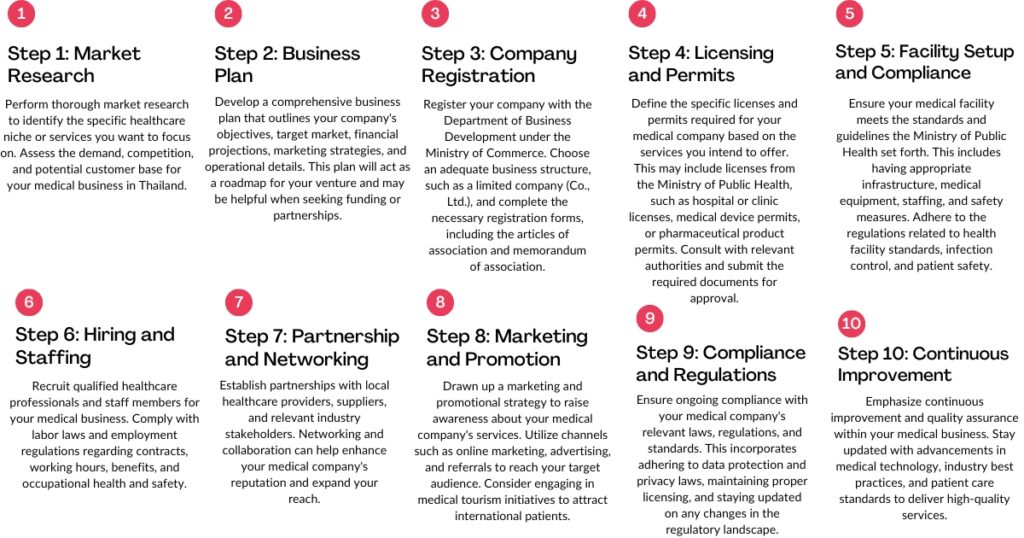Call us now:

Opening a medical company in Thailand.
Thailand is a rapidly developing country that has a high level of healthcare services and can provide a stunning investment climate to open a medical company in Thailand. Companies in this country also receive much support from the government, so you can get numerous advantages by opening their medical company with it. This country is now one of the most rapidly growing markets attracting an innovative community for generating successful businesses.
Table of Contents
What are the regulations for opening a medical company in Thailand?
When considering opening a medical company in Thailand, it is imperative to successfully comply with all the relevant regulations of the country. Specifically, the nine main categories of regulation include:
- Company Registration: It is necessary to register your corporation and submit the essential documents to the Department of Business Development. Documents include the company registration form, articles of association, and relevant shareholder information.
- Licensing: Different medical services may need operations permits depending on which of them you plan to offer. For example, different licenses are obligatory for all companies in the medical sphere: hospitals, clinics, and diagnostic centers which must be approved by the Ministry of Public Health.
- Foreign Business Restrictions: Several sectors are highly restrained, and the medical sector is one of them. Thus, it is necessary to engage a legal advisor to understand the regulation requirements for foreign investors in the medical industry of Thailand.
- Good Manufacturing Practice: If a medical company implies manufacturing pharmaceuticals, it is necessary to adhere to the Good Manufacturing Practice which is established by the FDA to regulate the quality, safety, and efficacy of pharmaceuticals produced.
- Medical Device Control: Medical devices’ import, manufacturing, or distribution are controlled by the Medical Device Act.
- Health Facility Standards: Various medical centers, including hospitals and clinics, must follow health facility standards and guidelines that are established by the Ministry of Public Health.
- Employment Regulations: A medical company is an employer entity that must fulfill labor laws that address employees’ benefits, contract establishment, and occupational health safety.
- Data Protection and Privacy: Patient data management is a central concern that must follow the PDPA, Personal Data Protection Act.
- Taxation and Accounting: Lastly, taxation and accounting requirements and special conditions for various types of companies.
How do you open a medical company in Thailand ?
Opening a medical company in Thailand involves several steps and considerations. There are ten general steps to consider :

Free
Consultation
What are the required licenses ?
The type of services and activities intended for the company determines the particular licenses needed. Currently, there are six standard licenses and permits required:
- Hospital License: Your medical company will need a hospital license if you intend to operate a hospital offering outpatient and inpatient services under the Ministry of Public Health. Moreover, this license assures that your establishment meets the required standards with the infrastructure, equipment, personnel, and patient welfare.
- Clinic License: If you aim to develop a medical company in Thailand offering outpatient services without admitting patients, your company will need a clinic license under the jurisdiction of the Ministry of Public Health. Furthermore, like the hospital license, the clinic license assesses that a company meets adhesion to the unique clinic requirements.
- Medical Device License: If your prospective Thai business plans to import, manufacture, distribute, or sell any medical devices, you shall be required to have a medical device license under the jurisdiction of the Thai Drug and Food Agency. Again, this license assures that your products meet the product requirements concerning safety, quality, and stipulated requirements.
- Pharmaceutical License: If you are forming a medical company that plans to import, manufacture, distribute, or sell any pharmaceutical products, you need a pharmaceutical license. Importantly, your pharmaceutical products are termed drugs in your intended country.
- Laboratory License: If you are considering opening a laboratory for testing and diagnosing, one needs a laboratory license under the jurisdiction Public Health Ministry. The Lab license assures that your company adheres to the quality and safety of the Laboratory in operation.
- Import-Export License: In consideration of dealing with importing and exporting of medical devices, pharmaceuticals, whether or any other healthcare-oriented products, one will need an import-export license under the jurisdiction of the Foreign Trade Department under the Commerce Ministry. Importantly, the license is critical means of establishing the compliance and adherence to the enterprise trading laws and customs.
Thus, the various licensing requirements may differ in requirements, which may characterize in terms of documentation, company facilities, quality control, or personnel qualification. Therefore, consulting with legal authorities or hiring a local representative may grant you precise and timely informations.
